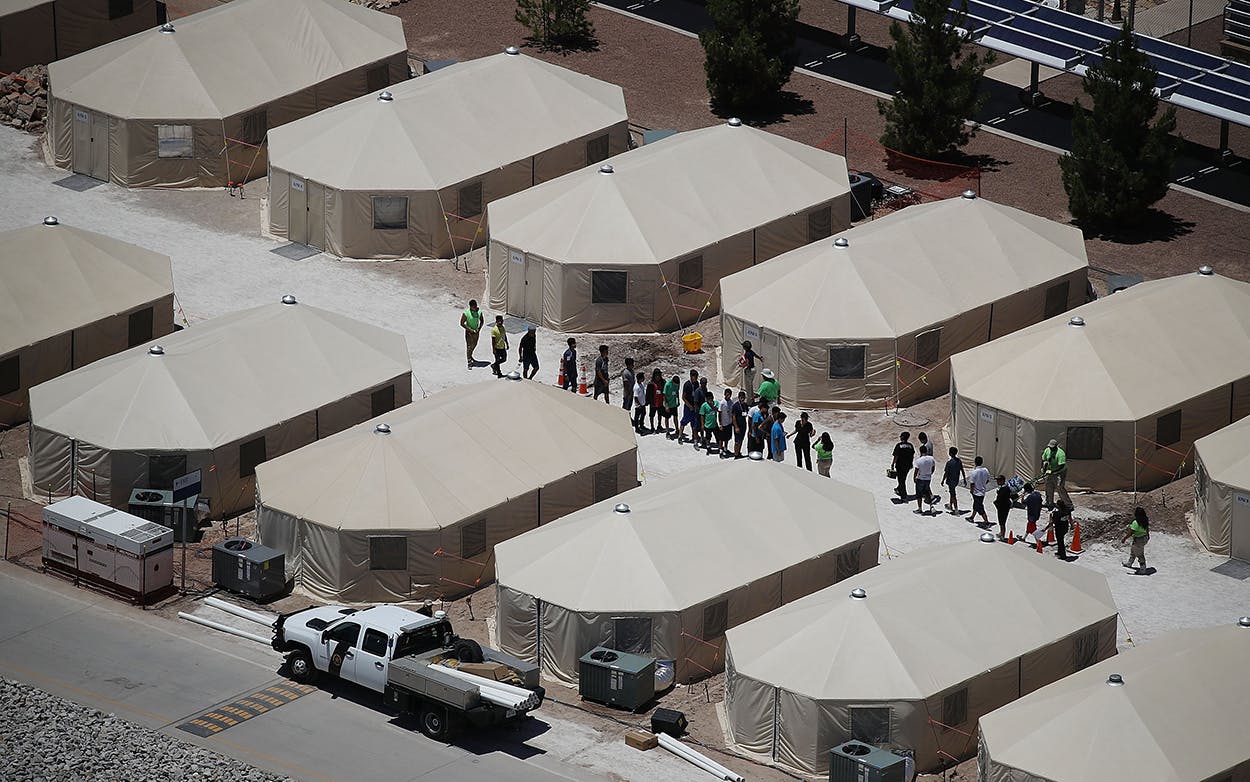El Paso’s sheriff has barred his deputies from working off-duty at a new temporary migrant children’s shelter, one of the most forceful steps yet from a growing chorus of law enforcement critical of the Trump administration’s practice of separating children and parents apprehended at the border. The U.S. Department of Health and Human Services this month opened temporary tent shelters in Tornillo, about thirty miles east of downtown El Paso, where the sheriff’s prohibition has taken effect. “The Sheriff’s Office will not be working at these facilities, as we don’t support the current administration’s position of separating children simply to discourage illegal immigration,” Sheriff Richard Wiles said. Law enforcement officers frequently work off-duty jobs to supplement their income, but such work requires approval from superiors.
Wiles said he was approached by federal officials to provide off-duty deputies for security work at the Tornillo facility but declined. “I just thought that if the citizens saw that we were working there in an off-duty capacity, it may be [seen] as if we were approving of the administration’s policy, and it would hurt our relationship with the community that we serve.”
El Paso city officials said that any outside employment by police or firefighters requires ten working days’ advance approval, and no requests have been received for work in Tornillo. It’s unclear who is providing security outside the shelter, but federal officials could contract with private security firms or off-duty officers from other regional law enforcement agencies. The Tornillo shelter began going up on June 10, with a capacity for 360 children. U.S. representative Will Hurd, R-Helotes, who represents the Tornillo area, toured the facility on Friday. He said the government’s plans allow for an expansion of up to 4,000 beds. Hurd said that the children currently housed in Tornillo are sixteen- and seventeen-year-old boys who arrived at the border unaccompanied by adults, but he said the facility will at some point take in children separated from their parents. He said the facility can accommodate boys and girls ages thirteen to seventeen.
The Trump administration said on Tuesday that it had removed 2,342 children from their parents at the border between May 5 and June 9. Officials could not say how many had been reunited. Law enforcement and other local government officials across Texas have denounced the Trump policy, though most don’t have the same ability as Wiles to act on their words. “Have you spoken out? If you support this [un-]American, un-Godly and inhumane policy, don’t try to convince those that don’t, save your rationale for God who is watching. WWJD?” Houston police chief Art Acevedo tweeted on Tuesday. Acevedo has tweeted against the family separation policy multiple times in recent days.
Have you spoken out? If you support this U.N.-American, un-Godly and inhumane policy, don’t try to convince those that don’t, save your rationale for God who is watching. WWJD? https://t.co/Nmia4bb6jf
— Chief Art Acevedo (@ArtAcevedo) June 19, 2018
Harris County Sheriff Ed Gonzalez also joined in the criticism, telling the Houston Chronicle that children should not be kept in immigration detention centers. “Separating families harms children,” Gonzalez said. “To me, it’s an affront to our American values.”
The U.S. Conference of Mayors plans to protest at Tornillo on Thursday. At its annual meeting last week, the conference passed a resolution declaring “its strong opposition to separating children from their families at the border” and calling on the administration “to immediately reverse these destructive policies and allow families apprehended to remain together to the extent possible, to help avoid the heartbreak and irreversible trauma of forced separation.”
Meanwhile, governors in Maryland, Massachusetts, New York, Rhode Island, and Connecticut have declared that their National Guard forces can’t be used in border operations. Trump ordered the National Guard to the border in April to bolster Border Patrol agents, even though apprehensions of undocumented immigrants remain near historic lows. Most of the National Guard forces have come from Texas, California, New Mexico, and Arizona, but some have come from other states.
Maryland governor Larry Hogan, a Republican, tweeted on Tuesday that he was recalling a small Guard contingent that had been operating just west of El Paso: “Until this policy of separating children from their families has been rescinded, Maryland will not deploy any National Guard resources to the border. Earlier this morning, I ordered our 4 crewmembers & helicopter to immediately return from where they were stationed in New Mexico.”
Until this policy of separating children from their families has been rescinded, Maryland will not deploy any National Guard resources to the border. Earlier this morning, I ordered our 4 crewmembers & helicopter to immediately return from where they were stationed in New Mexico. https://t.co/TEfkUXF7ZN
— Governor Larry Hogan (@GovLarryHogan) June 19, 2018
State representative César Blanco, D–El Paso, wrote a letter to Governor Greg Abbott on Monday asking that Texas pull back National Guard troops and other state border security measures until the Trump administration ended family separation. And Representative Jason Villalba, R-Dallas, made a similar request. Abbott has not responded. Texas House Speaker Joe Straus also spoke out against the policy, writing a letter to Trump directly asking him to discontinue the practice.
- More About:
- Politics & Policy
- Family Separation
- Donald Trump
- El Paso






